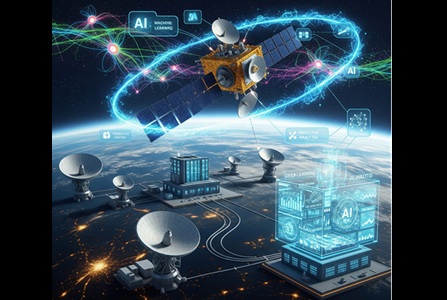The Impact of AI Technology on Global Satellite Communication Networks

The convergence of artificial intelligence (AI) and satellite communication is creating a transformative wave in global connectivity. The global market for artificial intelligence in satellite communication is witnessing remarkable growth, with its value projected to rise from $2.18bn in 2024 to $10.73bn by 2033, according to a new report by Research Intelo.
This expansion, driven by a strong compound annual growth rate (CAGR) of 18.7% over the forecast period, reflects the rising integration of AI across satellite-based networks to meet growing demands for speed, efficiency, and automation. As global demand for high-speed, secure connectivity surges, satellite communication systems are evolving into critical infrastructure. The fusion of AI with satellite technologies is transforming how space-based systems operate, enabling autonomous satellite functions, real-time data analysis, and smarter network optimization.
AI-driven automation is now central to both commercial and governmental satellite applications, as stakeholders seek to enhance system performance while reducing reliance on ground control. Several key factors are propelling this market growth. The rapid deployment of low Earth orbit (LEO) satellite constellations, increased investment by private space ventures and defense agencies, and the urgent need for bandwidth efficiency are pushing AI integration forward. However, the market also faces challenges, including high implementation costs, cybersecurity vulnerabilities, regulatory complexities, and a shortage of specialized talent in AI and aerospace engineering.
Technological advancements are reshaping the sector. AI now allows satellites to autonomously adjust their orbits, optimize antenna alignment, and respond to signal disruptions without human input. Predictive maintenance powered by machine learning helps preempt system failures, reducing operational downtime and costs. Bandwidth allocation is becoming more efficient, with AI dynamically managing traffic for data-heavy applications like streaming, emergency response, and rural internet access. Meanwhile, AI-enabled ground stations are enhancing data security by analyzing signals in real-time and identifying threats instantly.
Looking ahead, AI is set to become a core component of next-generation satellite networks. As satellite infrastructures expand and global connectivity needs grow more complex, AI will play an increasingly essential role in automation, analytics, and real-time decision-making across the space ecosystem.
Leading players in this fast-growing market include SES S.A., Intelsat, Eutelsat Communications, Viasat, Hughes Network Systems, Telesat Canada, Inmarsat, Iridium Communications, Thales Group, Lockheed Martin, and Northrop Grumman. Their combined efforts are shaping the competitive landscape and pushing the boundaries of AI-powered satellite communications worldwide.







